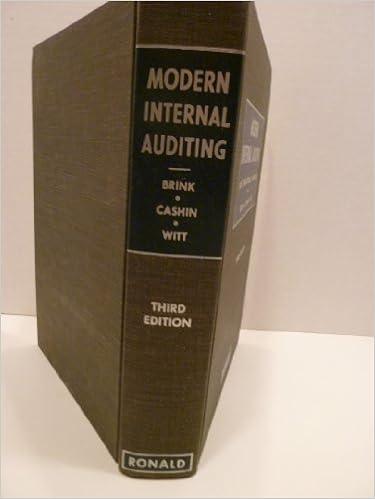Question
The unadjusted trial balance of Epicenter Laundry at June 30, 20Y6, the end of the fiscal year, follows: Epicenter Laundry UNADJUSTED TRIAL BALANCE June 30,
The unadjusted trial balance of Epicenter Laundry at June 30, 20Y6, the end of the fiscal year, follows:
Epicenter Laundry
UNADJUSTED TRIAL BALANCE
June 30, 20Y6
| ACCOUNT TITLE | DEBIT | CREDIT | |
|---|---|---|---|
| 1 | Cash | 11,000.00 |
|
| 2 | Laundry Supplies | 26,500.00 |
|
| 3 | Prepaid Insurance | 9,600.00 |
|
| 4 | Laundry Equipment | 232,600.00 |
|
| 5 | Accumulated Depreciation |
| 125,400.00 |
| 6 | Accounts Payable |
| 11,800.00 |
| 7 | Common Stock |
| 40,000.00 |
| 8 | Retained Earnings |
| 65,600.00 |
| 9 | Dividends | 5,000.00 |
|
| 10 | Laundry Revenue |
| 232,200.00 |
| 11 | Wages Expense | 125,200.00 |
|
| 12 | Rent Expense | 40,000.00 |
|
| 13 | Utilities Expense | 19,700.00 |
|
| 14 | Miscellaneous Expense | 5,400.00 |
|
| 15 | Totals | 475,000.00 | 475,000.00 |
The data needed to determine year-end adjustments are as follows:
| A. | Laundry supplies on hand at June 30 are $8,600. |
| B. | Insurance premiums expired during the year are $5,700. |
| C. | Depreciation of laundry equipment during the year is $6,500. |
| D. | Wages accrued but not paid at June 30 are $1,100. |
Required:
| Note: Download the spreadsheet on the T Accounts panel, saving the Excel file to your computer. Be sure to save your work in Excel. The spreadsheet input will not be included in your grade in CengageNOW on this problem. | |||||||||||||||||||||||||||||||||||||||||||||||||||||||||||||||||||||||||||||||||||||||||||||||||||
| 1. For each account listed in the unadjusted trial balance, enter the balance in a T account. Identify the balance as Bal. | |||||||||||||||||||||||||||||||||||||||||||||||||||||||||||||||||||||||||||||||||||||||||||||||||||
| 2. Using the Excel spreadsheet downloaded from the T Accounts panel, click the Work Sheet tab. Enter the unadjusted trial balance on the end-of-period work sheet and complete the work sheet. | |||||||||||||||||||||||||||||||||||||||||||||||||||||||||||||||||||||||||||||||||||||||||||||||||||
| 3. a. Journalize the adjusting entries on page 10 of the journal. Adjusting entries are recorded on June 30. Refer to the Chart of Accounts for exact wording of account titles. Be sure to add a posting reference to the journal. | |||||||||||||||||||||||||||||||||||||||||||||||||||||||||||||||||||||||||||||||||||||||||||||||||||
| 3. b. Post the adjusting entries. In the T accounts, identify the adjustments by Adj. and the new balances as Adj. Bal. | |||||||||||||||||||||||||||||||||||||||||||||||||||||||||||||||||||||||||||||||||||||||||||||||||||
| 4. Prepare an adjusted trial balance. | |||||||||||||||||||||||||||||||||||||||||||||||||||||||||||||||||||||||||||||||||||||||||||||||||||
| 5. a. Prepare an income statement for the year ended June 30, 20Y6. If a net loss has been incurred, enter that amount as a negative number using a minus sign. Be sure to complete the statement heading. You will not need to enter colons (:) on the income statement. Refer to the Chart of Accounts for exact wording of account titles. Refer to the lists of Labels and Amount Descriptions for exact wording of the answer choices for text entries other than account names. | |||||||||||||||||||||||||||||||||||||||||||||||||||||||||||||||||||||||||||||||||||||||||||||||||||
| 5. b. Prepare a statement of stockholders equity for the year ended June 30, 20Y6. During the year ended June 30, 20Y6, additional common stock of $7,500 was issued. If a net loss is incurred or dividends were paid, enter that amount as a negative number using a minus sign. Be sure to complete the statement heading. Refer to the Chart of Accounts for exact wording of account titles. Refer to the lists of Labels and Amount Descriptions for exact wording of the answer choices for text entries other than account names. | |||||||||||||||||||||||||||||||||||||||||||||||||||||||||||||||||||||||||||||||||||||||||||||||||||
| 5. c. Prepare a balance sheet as of June 30, 20Y6. Fixed assets must be entered in order according to account number. Be sure to complete the statement heading. You will not need to enter colons (:) on the balance sheet; they will automatically insert where necessary. Refer to the Chart of Accounts for exact wording of account titles. Refer to the lists of Labels and Amount Descriptions for exact wording of the answer choices for text entries other than account names. For those boxes in which you must enter subtracted or negative numbers use a minus sign. | |||||||||||||||||||||||||||||||||||||||||||||||||||||||||||||||||||||||||||||||||||||||||||||||||||
| 6. a. Journalize the closing entries on page 11 of the journal. Refer to the Chart of Accounts for exact wording of account titles. Be sure to add a posting reference to the journal. (Note: Complete the adjusted trial balance, the income statement, the statement of stockholders equity, and the balance sheet BEFORE completing part 6. a.) | |||||||||||||||||||||||||||||||||||||||||||||||||||||||||||||||||||||||||||||||||||||||||||||||||||
| 6. b. Post the closing entries. In the T accounts, identify the closing entries by Clos. | |||||||||||||||||||||||||||||||||||||||||||||||||||||||||||||||||||||||||||||||||||||||||||||||||||
| 7. Prepare a post-closing trial balance. The unadjusted trial balance of Epicenter Laundry at June 30, 20Y6, the end of the fiscal year, follows: Epicenter Laundry UNADJUSTED TRIAL BALANCE June 30, 20Y6
The data needed to determine year-end adjustments are as follows:
Required:
|
Step by Step Solution
There are 3 Steps involved in it
Step: 1

Get Instant Access to Expert-Tailored Solutions
See step-by-step solutions with expert insights and AI powered tools for academic success
Step: 2

Step: 3

Ace Your Homework with AI
Get the answers you need in no time with our AI-driven, step-by-step assistance
Get Started


